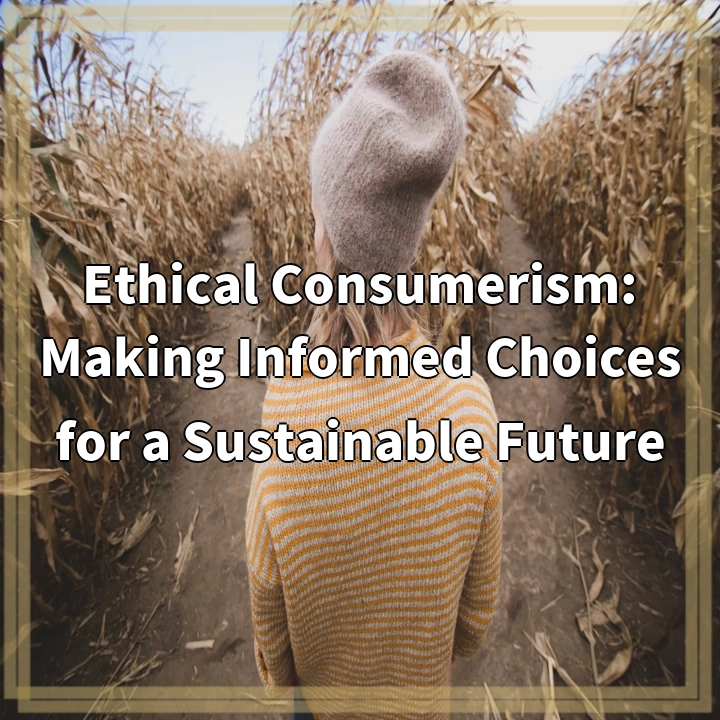
What it is:
Ethical consumerism refers to the practice of making purchasing decisions that are aligned with personal values, particularly concerning social, environmental, and ethical considerations. Consumers who engage in ethical consumerism often seek out products that are sustainably sourced, cruelty-free, fair trade, and produced by companies that engage in responsible labor practices. This approach not only impacts individuals’ purchasing choices but also encourages businesses to adopt more sustainable and ethical practices in order to meet consumer demands.
Real-World Problems
Despite the positive intentions behind ethical consumerism, there are significant real-world problems associated with its implementation and efficacy. One major issue is the prevalence of “greenwashing,” where companies falsely market their products as environmentally friendly or socially responsible without making any substantive changes. This can mislead consumers who are trying to make ethical choices, ultimately undermining the movement.
Limited Access and Awareness
Another problem is the limited access to ethical products, particularly in low-income communities. Many individuals may not have the means or opportunity to choose ethically produced goods, which can perpetuate inequalities in consumer options. Moreover, a lack of awareness or education about ethical consumerism and its impacts can hinder individuals from making informed decisions.
Higher Costs
Ethical products often come with a higher price tag due to sustainable practices, fair wages, and superior quality. This can deter budget-conscious consumers from purchasing these items, despite their alignment with ethical values. Consequently, ethical consumerism can sometimes become a privilege for those who can afford it, further alienating marginalized communities.
Complex Supply Chains
The complexity of global supply chains adds another layer of difficulty for ethical consumers. The journey from raw materials to finished products can involve numerous stages, making it challenging for consumers to trace the ethical practices of every company involved. As a result, consumers may struggle to verify the integrity of the products they purchase, leading to skepticism and confusion.
Impact on Small Businesses
Moreover, the focus on ethical consumerism can create challenges for small businesses that may lack the resources to meet the rigorous standards often associated with ethical products. While larger corporations can often absorb the costs of implementing sustainable practices, smaller enterprises may find themselves at a competitive disadvantage, leading to potential market monopolies.
Changing Consumer Habits
Lastly, changing consumer habits can pose difficulties for the movement. People may gravitate towards convenience, trends, and branding rather than considering the ethical implications of their purchases. This shift can limit the impact that ethical consumerism has on promoting sustainability and social justice.

Solutions to Ethical Consumerism Challenges
Addressing the challenges of ethical consumerism requires a multi-faceted approach that empowers consumers, supports ethical businesses, and promotes transparency within the market. Here are several key solutions that can help enhance ethical consumerism practices.
Raising Awareness and Education
One of the most effective solutions is to increase awareness and education about ethical consumerism. This can be accomplished through workshops, online resources, and community programs that inform consumers about the importance of their purchasing decisions. By providing information on how to identify ethically produced goods, consumers will be better equipped to make informed choices.
Supporting Transparency and Certification
Encouraging businesses to adopt transparent practices is crucial. Certification programs, such as Fair Trade and organic labeling, can assist consumers in identifying products that meet ethical standards. These certifications help build trust and create a clearer path for consumers who wish to shop responsibly.
Promoting Affordability
Creating initiatives aimed at making ethical products more affordable can help bridge the gap for consumers on tight budgets. This could include partnerships between ethical brands and local governments or nonprofits to subsidize costs, allowing broader access to sustainable choices.
Encouraging Local Purchasing
Encouraging consumers to buy from local businesses can help promote ethical practices while also supporting the local economy. When consumers choose to purchase from local artisans and producers, it reduces the carbon footprint associated with shipping and often ensures a more direct connection to the ethical practices behind the products.
Simplifying Supply Chains
Simplifying and shorting supply chains can enhance the traceability of products. Businesses can focus on sustainability and ethical sourcing by collaborating with fewer suppliers and ensuring adherence to ethical standards throughout the chain. This transparency allows consumers to understand the journey of their products better.
Encouraging Ethical Companies
Lastly, consumers can collectively push for change by supporting ethical companies through their purchasing power. By choosing brands that prioritize social and environmental responsibility, consumers send a signal to the market, encouraging more companies to adopt ethical practices. This grassroots movement can potentially create widespread change.















